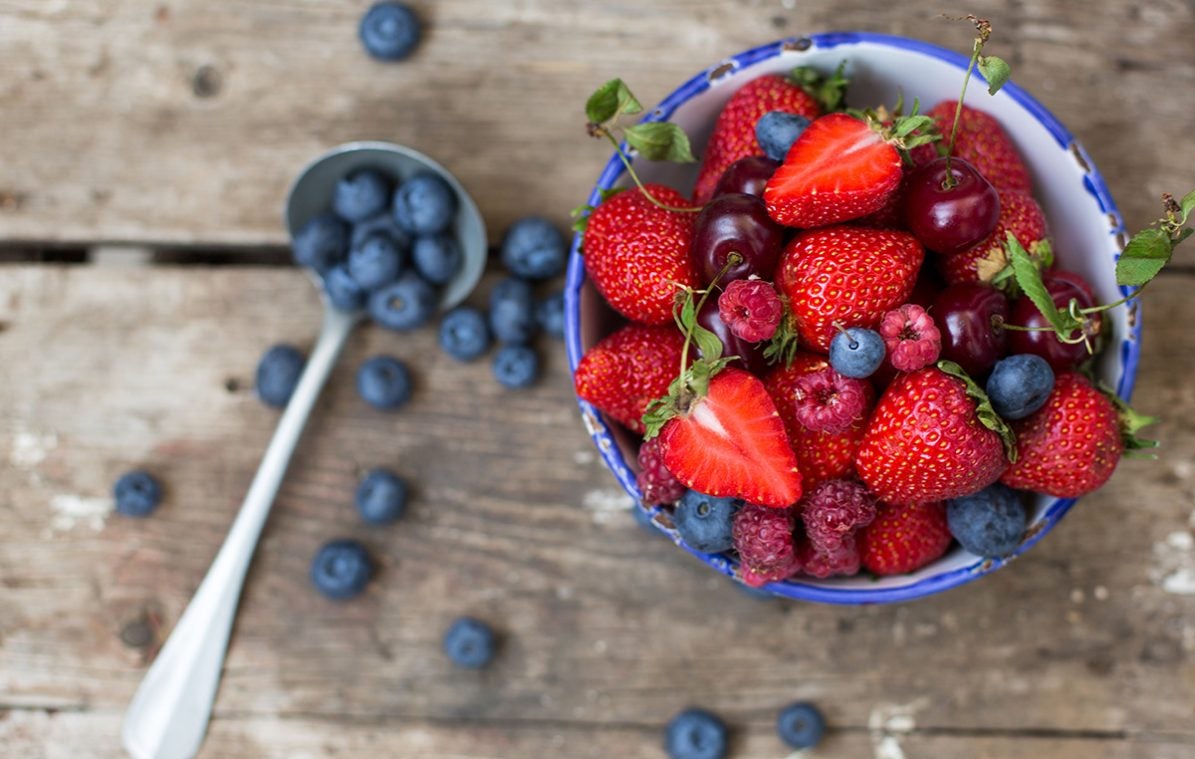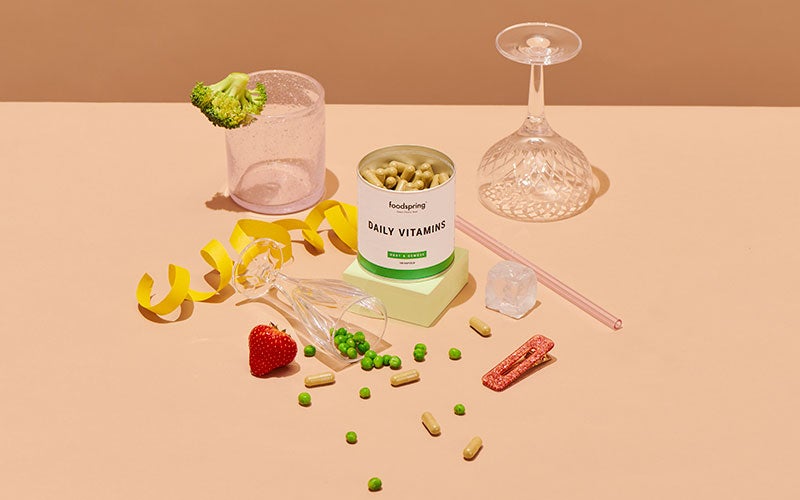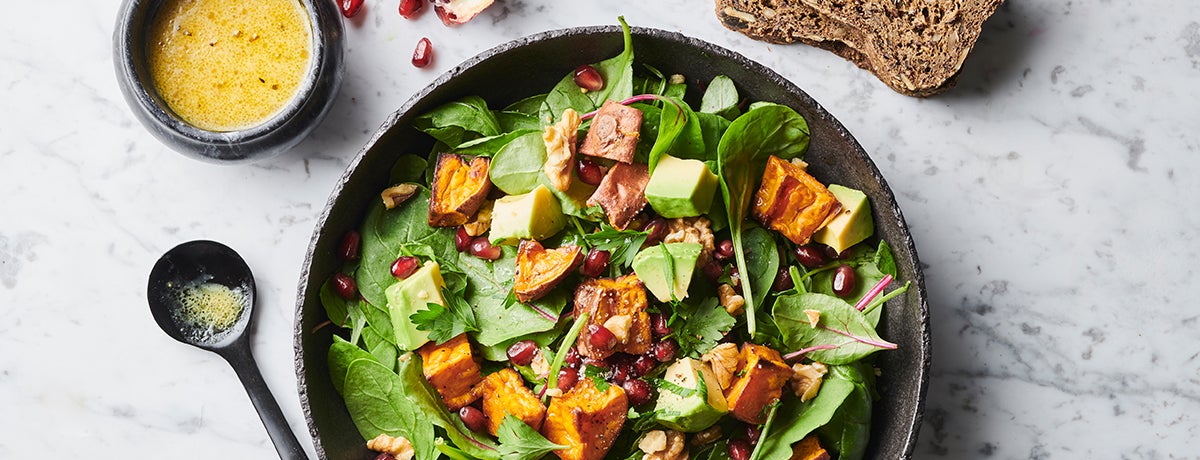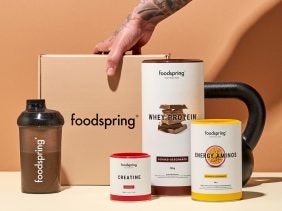Everything you never knew about the benefits of vitamins
 ©Julia Khusainova
©Julia Khusainova
Since we were little, we’ve known that fruit and vegetables are healthy because they have lots of vitamins. But why are these vitamins so important? Read on for everything you need to know about the benefits of vitamins and why you can’t live without them!
What Are Vitamins?
Vitamins are organic compounds in the category of micronutrients. They’re involved in every area of your body, from your metabolism to your nervous system. Your body needs vitamins for numerous functions including building muscle mass and maintaining healthy blood levels, as well as the everyday use of your tendons, ligaments, and muscles. The only problem is that your body can’t produce enough of them by itself, so you’ve got to get them from external sources like your diet. To avoid vitamin deficiencies, the NHS recommends eating five servings of fruit and vegetables a day.
Essential Vitamins
Your body needs vitamins and minerals to function, but unfortunately it’s only able to produce small them in small quantities, if at all. That’s why you have to take them in, or at least their precursors, so-called provitamins, through various foods. Current research has defined 13 essential ones, which are divided into water-soluble and fat-soluble categories that differ in their absorption, transport, storage, and excretion.
Our tip: With a packed daily schedule you might not always eat enough fruit and vegetables, but when that happens, there’s no need to panic! We’ve all been there, and it’s why we created our Daily Vitamins! Just two capsules a day give you all the benefits of vitamins and minerals you need. With 100% natural ingredients and no synthetic chemicals.

Fat-soluble Vitamins
Fat-soluble vitamins are stored in your body, which means you don’t necessarily need to worry about taking them regularly. On the contrary: If you take large amounts of some of them, through vitamin supplements for example, you can overdose. We recommend that you always consult a doctor before taking a fat-soluble vitamin.
Water-soluble Vitamins
In contrast, water-soluble vitamins are rarely stored in the body, or not at all. That means they have to be taken in regularly through food or supplements. If you’re otherwise healthy, however, you shouldn’t be able to overdose on these water-soluble micronutrients. Still, if you regularly take a supplement and suddenly feel unwell or experience side effects, you should consult a doctor.
What Do Vitamins Do?
In general, vitamins are involved in both tissue formation and energy production. Their health benefits also include an antioxidant effect, so some prevent the formation of free radicals in your body, which may reduce your risk of heart disease.
A few of these micronutrients also have specific functions in your body that are worth mentioning. For example, vitamin A plays an important role in your ability to see while a vitamin A deficiency can accelerate macular degeneration. The benefits of vitamin C include immune system support, while vitamin D deficiency can cause problems with your bone metabolism. B vitamins, including folic acid, pantothenic acid and thiamine (vitamin B1), are involved in cell function and division, the formation of red blood cells, the construction of genetic material, and the breakdown of fatty acids and amino acids. Getting enough vitamin B-9 (folic acid) during pregnancy also helps reduce the risk of developing birth defects like neural tube defects. Vitamin E may help prevent another heart attack, if you have heart disease.
Overview of vitamin sources
Check out what foods you could eat every day to get the recommended amount per day of each micronutrient at a glance in our table. Remember that our figures are rough guidelines and that individual requirements will vary depending on gender, age, height, and daily activity level.
| Vitamin | Food |
| Vitamin A | 1 carrot approx. 140g kale 140g spinach |
| Vitamin B6 | 1 banana 125g chicken breast 40g walnuts |
| Vitamin B12 | 150g salmon 1 slice of emmental cheese foodspring Vitamin B12 drops |
| Vitamin C | 1 orange 1 kiwi 200g strawberries |
| Vitamin D (when you can’t get enough from natural sunlight) | 150g herring 160g salmon foodspring Vitamin D3K2 drops |
| Vitamin E | about 10 hazelnuts 1 slice of whole-grain wheat bread 1 serving of spinach |
| Vitamin K | 140 g kale 1 serving of spinach 1 serving of cauliflower |
Vitamin-Rich Foods

If you maintain healthy habits and follow a balanced diet, you’re well on your way to optimizing your vitamin intake. All you need to get started is to make sure you eat five servings of fruit and vegetables a day! if you want to be more precise, it’s good to know which micronutrients are found in which foods, so we’ve listed 7 of the most important ones below. If you’re looking for a full recipe right away, check out one of our vitamin booster recipes.
-
Vitamin A
Animal-based products like liver, butter, and eggs contain this micronutrient in retinol form. As carotenoids, it’s found in various plants including carrots, sweet potatoes, spinach, and cabbage – or in beta-carotene supplements.
-
Vitamin B6
Food sources of vitamin B 6 include whole grains, hazelnuts, walnuts, red peppers, sardines, and mackerel. Fruit juices or dried fruits also contain some B6.
-
Vitamin B12
This vitamin occurs almost exclusively in animal products. Mostly we get it through milk and dairy products as well as eggs, fish, seafood, and poultry, which all contain comparatively high levels.
Our tip: With our Vitamin B12 Drops you can make sure you meet your recommended dietary requirements. They’re 100% vegan and therefore also appropriate for vegetarians and vegans
Get your Vitamin B12 now
-
Vitamin C
Various types of vegetables and fruit, or juices and smoothies made from them, have adequate amounts of this micronutrient. Sea buckthorn juice, peppers, blackcurrants, and parsley have a particularly high content per 100g, but orange juice, citrus fruits in general, potatoes, cabbage, spinach, and tomatoes also have enough C vitamin to cover your requirements.
-
Vitamin D
In contrast to other micronutrients, there are only a few foods with significant amounts of vitamin D. Fatty fish like salmon, herring, and mackerel contain the highest proportions of this micronutrient. Liver, egg yolk, and some edible mushrooms also have some. However, we generally get so little of this micronutrient in our diets that the NHS recommends taking supplements during the winter.
Our tip: Your body can absorb and use vitamin D better when it’s taken together with K2. Our Vitamin D3K2 Drops will get you through any dark season.
Click here for our Vitamin D3K2
-
Vitamin E
Vegetable oils, such as wheat germ or olive oil contain plenty of this micronutrient. Berries, peanuts, almonds, and hazelnuts are also rich in E.
-
Vitamin K
Leafy green vegetables like spinach and broccoli contain a comparatively high amount of vitamin K. Other good sources include milk and dairy products, as well as lean meat, eggs, and grains.
What Happens In a Vitamin Deficiency?
The consequences of a deficiency can vary a lot depending on the vitamin you’re missing. The first symptoms of a B12 deficiency can be fatigue, exhaustion, and reduced performance levels. Too little vitamin D can disrupt your bone metabolism. With a healthy and balanced diet, however, you don’t need to worry about most deficiencies. Vitamin C deficiency, also known as scurvy, hardly ever comes up in industrialized countries anymore. If you still think you might have a deficiency, contact your doctor.
Conclusion
- Vitamins are essential for numerous processes in your body.
- Most must be taken in through food because your body doesn’t produce them itself.
- Important vitamins include A, B6, B12, C, D, E, and K.
- They are divided into water-soluble and fat-soluble categories.
Sources for this article
We at foodspring use only high-quality sources, including peer-reviewed studies, to support the facts within our articles. Read our editorial policy to learn more about how we fact-check and keep our content accurate, reliable, and trustworthy.

































